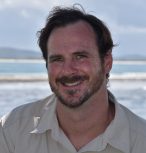DNA reveals the past and future of coral reefs
New DNA techniques are being used to understand how coral reacted to the end of the last ice age in order to better predict how they will cope with current changes to the climate. James Cook Univer

From 2005 to 2022, the main node of the ARC Centre of Excellence for Coral Reef Studies was headquartered at James Cook University in Townsville, Queensland (Australia)








Abstract. Unprecedented ocean temperatures caused by global warming are leading to mass bleaching events worldwide. Technological interventions have been hypothesised as a means of potentially mitigating coral bleachings. Increasing cloud reflectivity, by providing additional cloud condensation nuclei (CCN) in the form of nano sized salt crystals derived from evaporated sea water droplets is one such proposal which appears to be relatively environmentally benign. Calculations suggest that considerable cooling of sea surface temperatures could be achieved by operating within the natural range of clouds and CCN. This process termed Marine Cloud Brightening has the potential to be applied regionally over all, or a portion of reef areas, as a means by which to increase the reflectivity of clouds, reduce incoming solar radiation reaching the sea surface, and reduce ocean temperatures during periods of high coral temperature stress. Several different technologies exist in various stages of development for creating the required CCN in a sufficiently narrow nano sized distribution. Here I will describe the marine cloud brightening concept, the current state of technology development, engineering challenges, and how the technology could potentially be applied.
Biography. Daniel is an Oceanographer who somewhat unusually began his career with a degree in Civil Engineering. He quickly realised his passion was under the sea and has spent the last 13 years conducting oceanographic & engineering research in industry, non governmental organisations, and academia, including with the University of Sydney, the Sydney Institute of Marine Science, and as a visiting scholar to the University of Southern California, as well as various not for profits. He has worked on collaborative projects with the Royal Australian Navy, CSIRO, NASA, NOAA, the Inter American Tropical Tuna Commission, Australian Bureau of Meteorology, and many university collaborators. Along the way, he obtained a Masters and Doctorate from the University of Sydney in Biological Oceanography. His research interests include geoengineering, technologies to enhance carbon storage in the ocean, GIS applications in fisheries management, biogeochemistry & modelling of trophic level relationships in pelagic ecosystems, and anthropogenic influences on biochemistry. He is a 2017 Myer Innovation Fellow, and honorary research fellow at the Sydney Institute of Marine Science, and the University of Sydney.
New DNA techniques are being used to understand how coral reacted to the end of the last ice age in order to better predict how they will cope with current changes to the climate. James Cook Univer
A new study on the effects of climate change in five tropical countries has found fisheries are in more trouble than agriculture, and poor people are in the most danger. Distinguished Profess
James Cook University researchers have found brightly coloured fish are becoming increasingly rare as coral declines, with the phenomenon likely to get worse in the future. Christopher Hemingson, a
Researchers working with stakeholders in the Great Barrier Reef region have come up with ideas on how groups responsible for looking after the reef can operate more effectively when the next bleaching
Abstract: As marine species adapt to climate change, their heat tolerance will likely be under strong selection. Individual variation in heat tolerance and its heritability underpin the potential fo
Abstract: The Reef Ecology Lab in KAUST’s Red Sea Research Center explores many aspects of movement ecology of marine organisms, ranging from adult migrations to intergenerational larval dispersal
Abstract: Macroalgal meadows are a prominent, yet often maligned component of the tropical seascape. Our work at Ningaloo reef in WA demonstrate that canopy forming macroalgae provide habitat for ad
Abstract: Sharks are generally perceived as strong and fearsome animals. With fossils dating back at least 420 million years, sharks are not only majestic top predators but they also outlived dinosa
Abstract: Connectivity plays a vital role in many ecosystems through its effects on fundamental ecological and evolutionary processes. Its consequences for populations and metapopulations have been
Abstract: Evolution of many eukaryotic organisms is affected by interactions with microbes. Microbial symbioses can ultimately reflect host’s diet, habitat range, and even body shape. However, how
Abstract: The past few years have seen unprecedented coral bleaching and mortality on the Great Barrier Reef (GBR) but the consequences of this on biodiversity are not yet known. This talk will expl